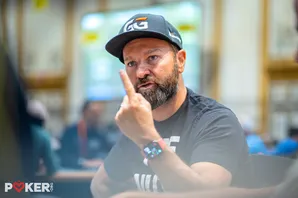The debate over how to prevent solver programs such as GTOWizard and other real-time assistance (RTA) from being surreptitiously used on smart devices at live poker tournaments has surged to the top of the hot-topics list in recent days. The catalyst: one player snapping a photo of one of his opponents accessing his GTOWizard app while seated at a recent WSOP tournament table and posting it on social media.
The Twitter/X post from James Chen on Thursday showed a player accessing his phone while seated at the table, with the GTOWizard logo from the app visible despite the phone's polarized-light privacy filter. It's become one of the most talked-about stories of the series so far.
The GTOWizard app owner was soon identified by commenters as Frederic Normand, a Canadian pro with almost $1.6 million in live-event winnings including wins in two major WPT events. Normand quickly acknowledged being the player in Chen's photos while castigating Chen for violating his privacy, and then claimed he was only opening GTOWizard to give access to the app to another player.
From there, the furor spread to cover several interrelated topics, showing exactly how thorny the RTA issue is in the modern poker world. From a complete ban on phones at the tables -- which is, sadly, probably the only truly effective deterrent to illicit RTA use -- to an anything-goes approach, the viewpoints covered the spectrum.
Tournament rules vary by location or tour
Among the many complicating factors is that tournament organizers have been chasing the issue for years. Many venues and tours rely on standard TDA (Tournament Directors Association) rules, while others have their own rulebooks, such as the World Series of Poker. That lack of uniformity breeds not only confusion, but also a sense of futility in finding and installing a permanent, effective solution.
Chen was among those who noted that the WSOP rules already appeared to ban the access of solvers at the table, while Pablo Mariz and Kenny Hallaert, who is also a prominent TD himself, argued over what is allowed and where:
From there, the rabbit hole grew wider and deeper. Yet the core debate was only a part of the story. Chen acknowledged that he and Normand got into a "heated argument", and while Normand quickly admitted to that, he and others quickly played the privacy card:
None, some or all? Or a different way of attacking the situation?
Solutions? There were plenty of proposals that ran the gamut from returning to a total ban on smart-device usage at the tables or dropping any attempt to enforce a solver ban altogether. Of course, banning phones at the table would be massively unpopular...
The debate rages on. Chen noted that any enforcement of the current rules has to include some aspect of player involvement, since tourney directors and dealers are too busy with other tasks to even notice when someone is accessing a solver app, charts, or other aids.
Yet some players suggested that taking an active role, as Chen did, was neither his job nor his right. That aspect of the debate also lacks an easy solution, if as much for social mores as anything else.
Making it an enforcement matter
Enter Andy Bloch, the long-time pro who was also once a part of one of the two storied MIT blackjack teams decades ago. According to Bloch, it doesn't matter how widespread the use of RTA is, if it's being done inside a Nevada casino, it's illegal:
Bloch went on to suggest that the WSOP or any individual player can (and probably should) make a complaint to the Nevada Gaming Commission if they have directly witnessed solver-app use. Unspoken by Bloch, though certainly implied, is that this approach would necessarily involve many players doing the reporting in order to become an effective anti-cheating tool.
The mess shows no signs of being resolved soon. Ultimately, the venues and tours will have to take the lead in the matter if they really want the RTA dilemma to be, well, solved. There are no easy solutions. Only time will tell, however, if truly correct ones can be found.


















